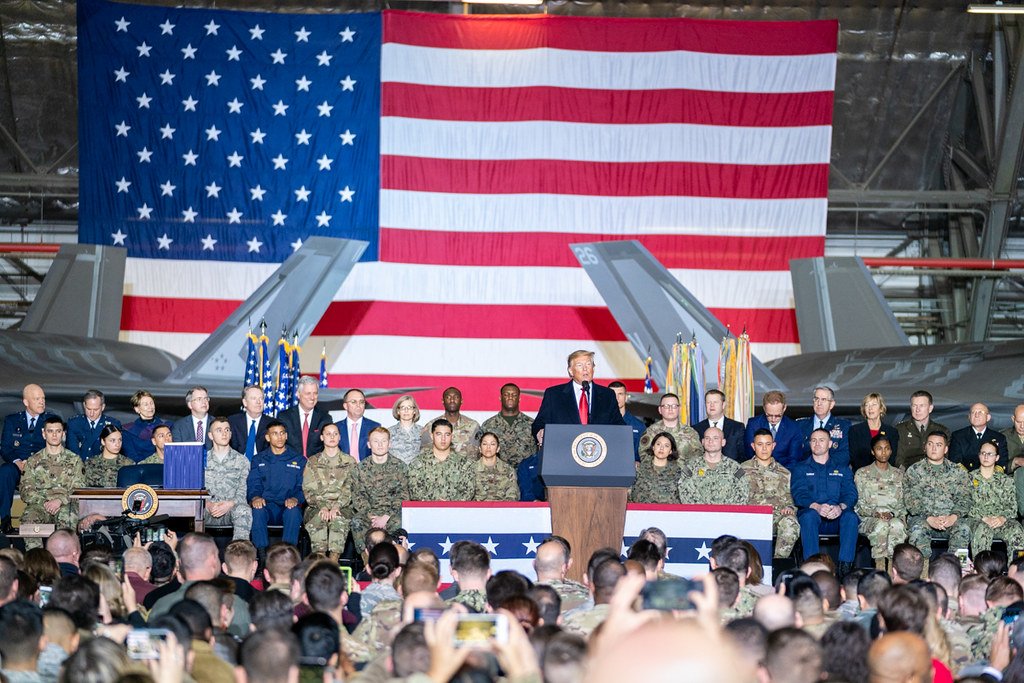Washington, D.C.—December 11, 2024…Today, Congressman Steve Womack (AR-3) voted to pass H.R. 5009, the Servicemember Quality of Life Improvement and National Defense Authorization Act (NDAA) for Fiscal Year 2025. The annual legislation authorizes $895.2 billion for our national security, including resources to enhance military preparedness, improve quality of life for our troops and their families, deter foreign adversaries, and focus the Department of Defense on its core mission. Congressman Womack secured Arkansas’ Third District priorities within the legislation, including authorizing funding for construction of the Ebbing Air National Guard Base Academic Training Center.
President Trump NDAA Signing 2020-Flickr Image
Congressman Womack said, “Passing the NDAA is vital to the safety and security of our homeland and strength of America’s armed forces. This year’s legislation aims to deter adversarial threats abroad and bolster defense capabilities nationwide—including in Arkansas—while improving the quality of life for servicemembers and their families. Although I’m strongly opposed to the decision to circumvent state’s rights regarding the forced federalization of National Guard formations, opposing this legislation is not the right way to address the issue. We can’t deprive our military of the resources needed to protect our nation. Today is a step in the right direction. However, the mission is not complete until we put resources toward these priorities in full-year defense appropriations.”
Provisions in the bill Womack strongly supports:
Encourages Department of Defense (DOD) to continue investing in expanding Iron Dome system production capacity in the United States, namely at the Camden, Arkansas facility.
Authorizes funding for Ebbing Air National Guard Base Academic Training Center in support of the F-35 FMS mission.
Authorizes a 14.5% pay raise for junior enlisted servicemembers, along with a 4.5% pay increase for all other servicemembers.
Expands access to childcare and employment opportunities for military families.
Refocuses the DOD on military readiness instead of domestic social policy by gutting DEI programs and prohibiting CRT.
Extends the Pacific Deterrence Initiative (PDI) and increases a funding authorization for new military technology to deter Chinese aggression in the Indo-Pacific region.
Reaffirms U.S. support to Israel against Iran, Hamas, and Hezbollah.
Reaffirms U.S. support to the defense of Taiwan against CCP threats.
Authorizes full funding for the deployment of National Guard troops at the southwest border and increases authorized funding by $20 million for DOD counternarcotics activities.
Blocks the Biden Administration’s plan to reduce the number of U.S. Special Forces, warfighting aircraft, and defense missiles.
Additional Provisions Congressman Womack Helped Secure:
Hot Springs, AR Army-Navy Hospital: Provides Arkansas three years to request permanent ownership of the former Army-Navy Hospital in Hot Springs, AR, and in the event of this request, would extinguish any reversionary interest in the property by the United States.
National Digital Reserve Corps: Creates a National Digital Reserve Corps to help federal agencies address cyber-attacks and critical workforce gaps as needed.
Expansion of National Guard State Partnership Program: Directs the Under Secretary of Defense for Policy, in consultation with the Secretary of State and the Chief of the National Guard Bureau, to assess and report on the feasibility and benefits of expanding the National Guard State Partnership Program in the Pacific Islands.
Assessment of U.S. Coast Guard Involvement in State Partnership Program: Directs the DOD to conduct a study on how to more actively consider and support the U.S. Coast Guard’s involvement in the State Partnership Program in the Pacific.
The FY25 NDAA will now advance to the Senate for consideration.



